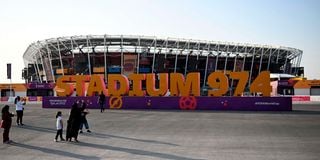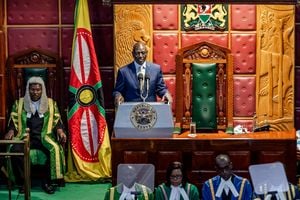World Cup’s growth and how Qatar 2022 finals will look like

People walk outside the Stadium 974 in Doha on November 15, 2022, ahead of the Qatar 2022 World Cup football tournament.
What you need to know:
- Losing the Copa America final at home to rivals Argentina left Neymar in tears.
Fifa decided to expand the World Cup to 48 teams from 32 in time for the 2026 tournament, which will be hosted by the United States, Canada, and Mexico.
The vote took place on June 13, 2018, during Fifa’s annual congress in Moscow and was open to all member nations.
Each Fifa member was allowed to cast a ballot, taking the power away from the select few who sat on the executive committee who used to decide World Cup hosts.
The U.S./Canada/Mexico bid received 134 ballots, while Morocco received 65.
Mexico will become the first nation to host three World Cups, while the United States will become the first country to host both men’s and women’s World Cups twice each—having hosted the 1994 men’s and the 1999 and 2003 women’s World Cups.
The United Bid proposed a World Cup hosted in 16 cities, with the final to be played at MetLife Stadium just outside New York City.
The bid forecast revenues of $14 billion, twice the amount presented by Morocco.
For Fifa, an organization that lost significant sponsorship income as a result of the 2015 scandals, the push was to have the U.S.-led bid win the hosting rights sweepstakes.
Fifa — the largest nonprofit in the world — had in 2018 revenues of $4.6 billion and cash reserves of $2.7 billion.
The men’s World Cup represents 93 percent of Fifa’s earnings. Money aside, the outcome of the vote was proof that different federations could come together, build a bid, and win.
The 2022 World Cup
In January 2019, Fifa president Gianni Infantino said they were exploring the possibility of having neighboring countries host matches during the 2022 tournament, but the plan never came to fruition.
“If we can accommodate some of the neighboring countries in the Gulf region which are very close by to host a few games in the World Cup this could be very beneficial for the region and the entire world,” Infantino told reporters.
The United Arab Emirates, Saudi Arabia, Bahrain, and Egypt all launched a diplomatic and trade boycott of Qatar in 2017 that complicated any prospect of sharing the tournament.
The countries have accused Qatar of supporting terrorism, which it denies.
Middle Eastern nations aren’t the only ones upset with Qatar. Norway, upset with Qatar’s human rights record, had threatened to boycott the World Cup.
At an extraordinary congress called by the Norwegian FA, 368 delegates voted for a motion rejecting a boycott, while 121 were in favor.
It was just one example of the possible activism teams and individual players could employ once they arrive in Qatar.
The 32-team tournament will once again feature eight groups of four.
As a result, four matches will be played each day (at 1pm, 4pm, 7pm, and 10pm local time) during the group stage, which will span a 12-day period and see winners and runners-up progress to the round of 16.
The tournament kicks off on November 21 on Sunday) at the Al Bayt Stadium in Al Khor with a match that will feature the host country. The final will be played on December 18 at Lusail Stadium in Doha.
Kickoff is scheduled for 6pm local time.
Here is a preview of what we can expect from several key nations at the upcoming World Cup:
Argentina:
Winners of the 2021 Copa America, Argentina finally won a major tournament for the first time since capturing the South American title in 1993.
The victory also allowed Lionel Messi to win a title with his country after so much club success at Barcelona. In attack, Lautaro Martínez did an exceptional job playing alongside Messi. He’s quick and consistent and can provide goals when needed.
His success at Inter Milan has translated well for the national team, something that can blossom in the lead-up to the World Cup if he can stay healthy. Nicolás Otamendi has been the defensive anchor, providing experience on a back line that features lots of young players.
Belgium:
The Red Devils looked poised to win the Euros, but they fizzled out in the quarterfinals amid talk that their golden generation had come to an end.
It’s possible that the Belgians have run out of gas, and an older team at the next World Cup doesn’t necessarily mean they will win it. Nonetheless, striker Romelu Lukaku is one of the best, and midfielder Kevin De Bruyne may still have something left in the tank to get to the finish line.
Brazil:
Losing the Copa America final at home to rivals Argentina left Neymar in tears.
The Brazilian striker will be looking to win a major trophy of his own, with the five-time World Cup champions always a favorite on the eve of the tournament.
Neymar, who has said this upcoming World Cup could be his last, is just one piece of the Brazilian puzzle that needs to come together.
In attack, the youngster Vinicius Júnior of Real Madrid is expected to take part in his first World Cup. He is Neymar’s heir apparent.
The pair could be joined up front with winger Rodrygo, who also plays for Real Madrid.
England:
The Three Lions go into Qatar 2022 as one of the pre-tournament favorites. The team has grown immensely under manager Garett Southgate. England finished fourth at the last World Cup and as runners-up at the Euros.
Striker Harry Kane remains largely underrated, while England’s new generation of players, spearheaded by Jadon Sancho, hope to lead the team to a trophy for the first time since being crowned world champions in 1966.
France:
Thinking that France can win the World Cup for a second straight time isn’t much of a stretch. They are, after all, the defending champions and feature Kylian Mbappe, one of the planet’s best strikers.
Les Bleus didn’t look so strong at the 2020 European Championship. France’s stock had dropped. By October 2021, it was France who showed that they are the frontrunners to repeat as World Cup champions.
France’s UEFA Nations League triumph put them back in top position. In the semifinals against Belgium, France scored three unanswered goals to record an epic 3–2 come-from-behind victory. In the final, France, down 1–0 to Spain, scored twice late in the game (including off a controversial Mbappe goal 10 minutes from time) for the 2–1 win.
Germany:
The Germans, under new manager Hansi Flick, have hit the reboot button now that the Joachim Löw era has come to an end.
His reign included guiding the Germans to the World Cup title in 2014, although they have done little else since then. The Germans always find a way to make an impact at any tournament. They have the tradition and the players to go far once again. Kai Havertz is the team’s midfield lynchpin, and striker Serge Gnabry will be called on to step up their game.
Netherlands:
The Dutch, currently coached by the veteran Louis van Gaal, have never won a World Cup, but they have made a very large impact on the tournament throughout the years.
In 2022, the Dutch could find themselves contending for the title of world champion after finishing runners-up three times in their history. Striker Memphis Depay has all the qualities and talent to lead the Netherlands to a deep run. He remains one of the world’s best forwards, but certainly his stock will rise if he can help the Dutch win a World Cup.
Qatar:
The host nation, which will make their World Cup debut, has a relatively young and modest soccer pedigree. Qatar has played in 10 Asian Cup tournaments, winning it once in 2019 with Sudanese-born striker Almoez Ali scoring nine goals.
Not having to qualify for 2022 meant that Qatar didn’t get the chance to play competitive matches. Instead, Qatar was invited to play at the 2019 Copa America, where they finished last in Group B with a 0-1-2 record behind Colombia, Argentina, and Paraguay.
In 2021, they were invited to participate in the Gold Cup, where they won Group D with a 2-1-0 record. Qatar bowed out in the semifinals, losing 1–0 to the United States. Nonetheless, Ali finished as the tournament’s top scorer with four goals.
Spain:
Manager Luis Enrique turned some heads when he named a team at Euro 2020 without any Real Madrid players. The experiment to focus on a new generation worked as La Roja reached the semifinals, losing to Italy in a shootout. In midfield, Spain has two of the most promising players in Pedri and Gavi.
The duo have the skill to replicate the success of Xavi and Andrés Iniesta.





